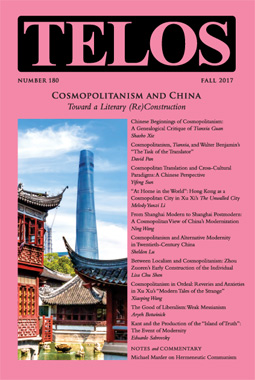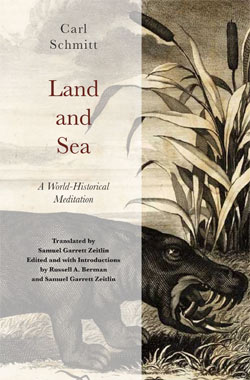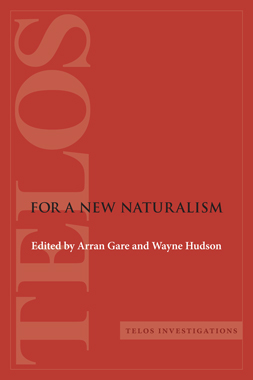By Russell A. Berman · Monday, September 18, 2017 The following paper was presented at the conference “After the End of Revolution: Constitutional Order amid the Crisis of Democracy,” co-organized by the Telos-Paul Piccone Institute and the National Research University Higher School of Economics, September 1–2, 2017, Moscow. For additional details about the conference as well as other upcoming events, please visit the Telos-Paul Piccone Institute website.
Theodor Fontane, the master of German realist fiction, published his first novel, Before the Storm, in 1876. Set during the winter of 1812–13, in and around Berlin, it explores the decisive historical moment when Prussia changed sides—breaking out of its forced alliance with France in order to side with Russia in the anti-Napoleonic war. Yet the dialectic of the moment was such that Germans could join in the rout of the French while nonetheless embracing aspects of the French revolutionary legacy. Thus near the conclusion of the novel, the Prussian General von Bamme, commenting on social changes around him, a reduction in traditional structures of hierarchy, speculates, “And where does all this come from? From over yonder, borne on the west wind. I can make nothing of these windbags of Frenchmen, but in all the rubbish they talk there is none the less a pinch of wisdom. Nothing much is going to come of their Fraternity, nor of their Liberty: but there is something to be said for what they have put between them. For what, after all, does it mean but: a man is a man.” Mensch ist mensch.
Continue reading →
By David Pan · Thursday, September 14, 2017 The following paper was presented at the conference “After the End of Revolution: Constitutional Order amid the Crisis of Democracy,” co-organized by the Telos-Paul Piccone Institute and the National Research University Higher School of Economics, September 1–2, 2017, Moscow..
The idea of liberal democracy only makes sense because of a basic contradiction between liberalism and democracy. As a description of a form of government, democracy designates a government by the people, whose decision-making power would not be restricted by any higher authority. The power of democracy derives from its ability to mobilize a majority of the members of a political order for collective goals. This rule by popular will can also entail a freedom from higher authorities, including such entities like monarchs and aristocrats, but also ecclesiastical or moral authorities that would establish basic values for guiding decision-making. Since democracy alone would lack constraints on the popular will, liberalism, as a set of principles that include protection of minorities and freedom of expression, is needed to provide the limitations on democratic decision-making that protect democracy from erratic and changes in the public mood. As such, liberalism sets a limit on democratic power, and the basic contradiction between democracy and liberalism maintains a dynamic equilibrium between popular will and liberal principles that can be stabilizing due to its flexibility.
Continue reading →
By Ning Wang · Wednesday, September 13, 2017 Telos 180 (Fall 2017) is now available for purchase in our store.
 In Western as well as international academia today, along with the acceleration of globalization more generally, humanities scholars have constructed a sort of theoretical discourse of globalization. In doing so, they have found it useful to refer to the old-fashioned philosophical concept of cosmopolitanism, which is very close to the theoretical construction of the discourse of globalization. Although it has previously been discussed over the history of Western philosophy, cosmopolitanism is once again a cutting-edge theoretical topic. The term nowadays frequently appears in the works of political philosophers and sociologists, and it is increasingly being taken up and debated by literary and cultural studies scholars as well, particularly with regard to the rise of world literature as the highest phase of comparative literature. Obviously, most of their work interprets and deals with cosmopolitanism from the perspectives of political philosophy and culture, while touching to some degree upon literary and cultural production and criticism. Moreover, most of the scholarship dealing with cosmopolitanism only occurs within a Western context. In this respect, the present special issue of Telos may well fill a gap in international cosmopolitanism scholarship. The recent interest in world literature in the field of comparative literature is undoubtedly associated with the rise of cosmopolitanism in the contemporary era. In the articles collected here, cosmopolitanism will mainly be addressed from literary and cultural perspectives, and, more importantly, they will move beyond the limits of Eurocentric or West-centric ways of thinking and modes of research by dealing exclusively with cosmopolitanism and China: its parallel relations with ancient Chinese philosophy, its impact on modern Chinese literature and intellectual thought, and its recent significance to China’s modernization and globalization. In Western as well as international academia today, along with the acceleration of globalization more generally, humanities scholars have constructed a sort of theoretical discourse of globalization. In doing so, they have found it useful to refer to the old-fashioned philosophical concept of cosmopolitanism, which is very close to the theoretical construction of the discourse of globalization. Although it has previously been discussed over the history of Western philosophy, cosmopolitanism is once again a cutting-edge theoretical topic. The term nowadays frequently appears in the works of political philosophers and sociologists, and it is increasingly being taken up and debated by literary and cultural studies scholars as well, particularly with regard to the rise of world literature as the highest phase of comparative literature. Obviously, most of their work interprets and deals with cosmopolitanism from the perspectives of political philosophy and culture, while touching to some degree upon literary and cultural production and criticism. Moreover, most of the scholarship dealing with cosmopolitanism only occurs within a Western context. In this respect, the present special issue of Telos may well fill a gap in international cosmopolitanism scholarship. The recent interest in world literature in the field of comparative literature is undoubtedly associated with the rise of cosmopolitanism in the contemporary era. In the articles collected here, cosmopolitanism will mainly be addressed from literary and cultural perspectives, and, more importantly, they will move beyond the limits of Eurocentric or West-centric ways of thinking and modes of research by dealing exclusively with cosmopolitanism and China: its parallel relations with ancient Chinese philosophy, its impact on modern Chinese literature and intellectual thought, and its recent significance to China’s modernization and globalization.
Continue reading →
By Telos Press · Wednesday, September 6, 2017 In a new review essay in Thesis Eleven, Peter Murphy writes about Carl Schmitt’s Land and Sea: A World-Historical Meditation, translated into English by Samuel Garrett Zeitlin and published by Telos Press Publishing. Purchase your copy of Schmitt’s Land and Sea in our online store and save 20% by using the coupon code BOOKS20.
An excerpt from the review:
 Samuel Zeitlin’s adroit, elegant translation of Carl Schmitt’s Land and Sea is sparkling to read. The book moves along with great energy, vibrant economy, and penetrating succinctness. The translation deftly conveys a book that is as short and direct as it is world-historical in scope. Its inquisitive reach expands as its flinty prose shrinks to the point of pithy, terse deliberateness. In 100-odd crisp pages it moves with panoptic concision from the ‘Potamic’ river cultures of the Middle East to the inland sea of the Mediterranean and across the oceans of modernity. The volume is beautifully produced by Telos Press. Samuel Zeitlin’s adroit, elegant translation of Carl Schmitt’s Land and Sea is sparkling to read. The book moves along with great energy, vibrant economy, and penetrating succinctness. The translation deftly conveys a book that is as short and direct as it is world-historical in scope. Its inquisitive reach expands as its flinty prose shrinks to the point of pithy, terse deliberateness. In 100-odd crisp pages it moves with panoptic concision from the ‘Potamic’ river cultures of the Middle East to the inland sea of the Mediterranean and across the oceans of modernity. The volume is beautifully produced by Telos Press.
Continue reading →
By Telos Press · Friday, September 1, 2017 Telos Investigations is a new book series that collects papers delivered at Telos-Paul Piccone Institute conferences. The first volume in the series, For a New Naturalism, edited by Arran Gare and Wayne Hudson, is now available for purchase in our online store. Save 20% on the list price by using the coupon code BOOKS20 during the checkout process.
 Western civilization has been afflicted by a divide between the sciences and the humanities, a divide that has been harmful to both. The first volume in our new Telos Investigations series, For A New Naturalism elaborates the implications of recent developments in natural philosophy that challenge both Cartesian dualism and reductionism. The contributors to this volume write from a variety of political, philosophical, and scientific standpoints. They all agree, however, that a civilization based on reductionist naturalism, with its impoverished understanding of both human life and the universe, is failing to generate the political and social thought we need. And they all support the need for a wider naturalism than the objectivating naturalism that emerged in seventeenth-century Europe. In addressing the contested status of naturalism in contemporary philosophy, the contributions to this volume question both prevailing assumptions about nature and assumptions about what is knowledge. They argue for a new alliance between science and the humanities, and spell out some of the implications of this challenge for philosophy, society, and religion. Western civilization has been afflicted by a divide between the sciences and the humanities, a divide that has been harmful to both. The first volume in our new Telos Investigations series, For A New Naturalism elaborates the implications of recent developments in natural philosophy that challenge both Cartesian dualism and reductionism. The contributors to this volume write from a variety of political, philosophical, and scientific standpoints. They all agree, however, that a civilization based on reductionist naturalism, with its impoverished understanding of both human life and the universe, is failing to generate the political and social thought we need. And they all support the need for a wider naturalism than the objectivating naturalism that emerged in seventeenth-century Europe. In addressing the contested status of naturalism in contemporary philosophy, the contributions to this volume question both prevailing assumptions about nature and assumptions about what is knowledge. They argue for a new alliance between science and the humanities, and spell out some of the implications of this challenge for philosophy, society, and religion.
Continue reading →
By Ellen Hinsey · Thursday, July 13, 2017 In the wake of the Brexit vote and the 2016 American presidential election, the idea began to circulate that we were witnessing a trans-Atlantic, populist “revolt against the elites,” which had spontaneously arisen from populations whose concerns had, for too long, gone unheard by those in power. Longstanding economic problems regarding income disparity and wealth—left unaddressed by both sides of the political spectrum—are indeed among the most pressing issues that we currently face. But as has been observed, the first half-year of the new U.S. presidential administration, with one of the wealthiest cabinets in American history, calls into question the validity of the “populist” interpretation in the U.S. context. The failure of this theory has in turn exposed a gap in our ability to conceptualize what actually happened during the U.S. election, what is unfolding before us, and how we got here.
Continue reading →
|
|





